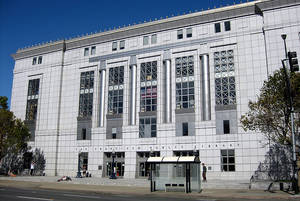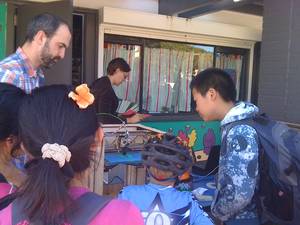Future Now
The IFTF Blog
Libraries as the Commons for Creation
Libraries are the future of making. Everyone knows that libraries have books, and more recently DVDs and free internet. But libraries all over the country are beginning to curate collections of manufacturing equipment, and in the nature of the library all of this is available for public use. If you have ever spent any time in a metal shop or a wood shop, you will know that they have equipment that is loud, messy, and potentially dangerous, without the proper safety training. This type of environment is — on the surface anyways — the exact opposite of the quiet, comfortable reading space that libraries have become. At the core however, both books and 3D printers share some surprising similarities.

Photo Credit: willyg on flickr
A good friend told me that libraries are the original hackerspaces, (roughly synonymous with "makerspace"). This was really interesting, as I'm a huge fan of hackerspaces, so I decided to look into the history of libraries. It turns out that libraries aren't just about media collection and distribution. In this short video, R. David Lankes, professor at Syracuse's iSchool, says,
"The image of the library as a book palace, crammed to the rafters with things to read, and that being its sole purpose is a modern invention. It's about a 60 year old invention."
The original concept behind free libraries, the first in America were set up by people like Benjamin Franklin, was that they were to be a social gathering space, or a public commons. From my personal experience with libraries, it seems that they have strayed from this original purpose as the commons, and they are mostly just "Book Palaces." Alas, there is hope, many librarians are actively experimenting with the defining aspects of what takes to make a library.
In an interview with NPR, Jeff Krull, director of the Alan County Public Library, he said,
"We see the library as not being in the book business, but being in the learning business, and the exploration business, and the expand-your-mind business. We feel this is really in that spirit, that we provide a resource to the community that individuals would not be able to have access to on their own."
In my quest to learn more about this new world, I turned to my local library in San Francisco, and learned that in true maker-fashion, the San Francisco Public Library (SFPL) is trying stuff out to see what works. But this isn't any willy-nilly playing around, SFPL plans to re-imagine their teen space, which is currently a lonely collection of about a dozen bookshelves and a few chairs. SFPL is not alone. They have a long list of collaborators in on this project, some of which include KQED (San Francisco's local NPR/PBS station), the Bay Area Video Coalition, and California Academy of Sciences, a world renowned science museum. Together these groups are working to create an environment where teens can develop new, needed literacies that will equip them for life in the 21st century.
The SFPL recently hosted a makerspace-style pop-up event for teens called " Hive Pop-Up: Maker Hacker Pop-up Media Jam Fest for Teens. Save the Earth!” " Participants could make internet memes about nature (mostly revolving around squirrels), or experiment with stop-animation video claymation. Many people invented things using LEGOS. One of my favorites is a bridge the teens built that will help prevent pollution in the Pacific Ocean. Type A Machines, a local San Francisco 3D printer company, brought one of their machines, in order to show the teens that in the future, you will be able to make anything. Check out more cool inventions on the library's maker blog at hivesf.tumblr.com.

Photo Credit: SFPL on Facebook
Jon Worona, of SFPL, sees great potential in using 3D printers as a conduit for learning, and this is about way more than just making stuff. 3D printers share a lot in common with books, they open new worlds of understanding to the user, and hold in them the basic lessons that we all need to learn. Just like a book they embody limitless possibility, and bridge socio-economic gaps. Anyone can learn to use a 3D printer, just like anyone can learn to read a book.
The process of 3D printing can get pretty involved, it takes time and determination to operate one of these machines. It starts with a 2D concept design, like a drawing, a basic maker skill that can benefit everyone. Next, 3D modeling with CAD software promotes software literacy. Understanding the material properties for the printer filament and the sourcing of these materials open the doors to material science and environmental literacy. Each of these steps in the printing process is a potential jumping off point where anyone can get inspired and dive into that subject and strive to become an expert, and if they don't want to become an expert in design or manufacturing, they are now stocked with the skills needed to tackle nearly any problem, skills like critical thinking and hypothesis testing.
When I spoke with Jon he was talking about so much more than just books and 3D printers. He is acting on this concept of making stuff in libraries, Jon sees the role of a library as a public commons where people can get together to become content creators, to become hackers and makers. Hands on learning is a big part of this, research has shown that when students in school do more engaged learning activities, they learn more. Don't believe me? Check out this article by Karen P. Kaun.
All of the evidence showing that we need to be creating hands-on-learning spaces begs the question why so many learning spaces are engineered to be so sterile. Makerspaces, especially in libraries, will help remedy this by bringing life and energy back into our learning spaces. Through these spaces, we, and for generations to come, will gain fluency in the new literacies of the future such as technology, the environment, and even civic engagement, such as making bridges to prevent pollution.
In a present where fewer and fewer people have basic maker skills, and with a future where these skills will be as important to have as they ever have been, libraries with makerspaces will help us be prepared for any future. Whether it be one where everything is automated, or one where we build and make everything we own. These are important skills to hone, and it is imperative that we have spaces, free for everyone, where we can do just that.



